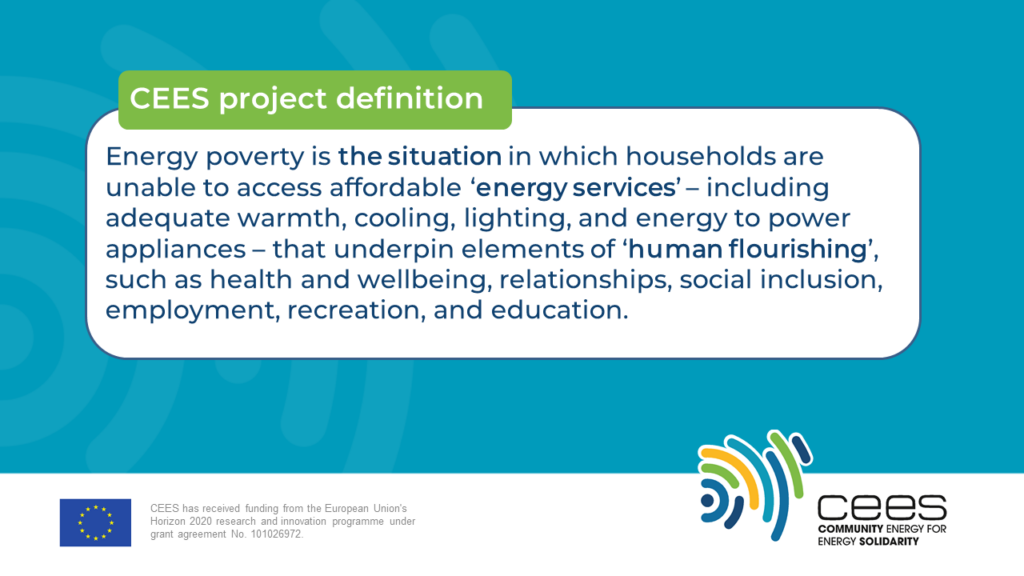The number of EU citizens being driven into energy poverty is expected to rise sharply over the coming winter … and perhaps for years to come. It’s time to practice energy solidarity!
Across Europe, energy prices are sky-rocketing as Russia’s invasion of Ukraine strains gas supplies and taxes and tariffs to support the clean energy transition account for a higher share of energy bills. The Community Energy for Energy Solidarity (CEES) project is investigating how community-owned systems that produce and distribute electricity locally can become leaders in tackling energy poverty.
In Session 1 (of 5) during a full day of webinars, learn about the CEES’ overarching aim and the three underlying themes behind their collective action:
CEES Partners include: ALIenergy (Scotland) / Coopernico (Portugal) / Repowering London (UK) / ZEZ (Croatia) / Les 7 vents (France) / Enercoop & Energie solidaire (France) / REScoop (Belgium) / University of Birmingham (UK) / The Energy Action Project (France) / SNAP Solutions (Portugal)
Theme 1: Energy poverty
To dive deeper into the situation of energy poverty, Dr. Rosie Day (University of Birmingham) explained how the concept of ‘fuel poverty’ came into being and definitions have since evolved. Much of the work done by academics and practitioners has aimed to better identify who is affected and what can be done to address the problem. Having a clear definition supports being able to do five key things:
- Identify indicators that can be measured
- Assess the problem and its extent
- Compare over space and time
- Focused action with clear aims
- Evaluate change as a result of action
In 2009, the European Commission (EC) first introduced concept of energy poverty into Third Energy Package, signalling its recognition of the problem and the need to find solutions. Ten years later (2019), the Clean Energy for All Europeans package made it a requirement that Member States take action on energy poverty.
In parallel, academic and practical work has advanced along multiple fronts, recognising a broader scope of situations and the need to think beyond access to affordable energy to encompass the energy services that support the right to a dignified life.
While many disconnects still exist and legal obligations remain vague and weak, in light of these advances and reflecting the ‘capabilities approach’ of Amartya Sen and Marth Nussbaum, CEES has adopted the following definition of energy poverty.

Theme 2: Energy communities
In a short ‘teaser’ of a longer presentation in Session 4 of the webinar, Heleen Schockaert (REScoop.eu) reminded participants that energy communities (ECs) largely began as grassroots groups of individuals whose shared values for locally produced renewable electricity prompted them to invest collectively in systems to serve citizens. In recent years, European law has officially recognised both ‘citizen energy communities’ and ‘renewable energy communities’.
CEES is closely aligned with REScoop.eu, the European federation of citizen energy cooperatives, which brings together more than 1 900 initiatives and their 1.25 mln citizens. Together, we supports the ’10 Reasons to start or join a community energy project’ put forth by Friends of the Earth Europe.

By 2050, according to some estimates, 1 in 2 EU citizens could be involved in mechanisms that enable them to produce their own electricity. In light of the current crisis, this could enable security of supply, lower and more stable prices, and a more community-centred approach to energy supply.
Link to Session 4: Building support for ECs to tackle energy poverty: Legal and regulatory frameworks / financing and funding for a more in-depth exploration of policy and legal frameworks – at both EU and national levels – for both energy communities and energy poverty.
Theme 3: Energy solidarity
As noted above, CEES considers energy solidarity to involve many people for many purposes. A core element of CEES is for partners to practice solidarity in their engagement with households facing energy poverty and with each other. CEES partners were selected for having expertise in different areas of the complex challenge of tackling energy poverty. Sabrine Boudjemline (Les 7 vents) highlighted key words that reflect energy solidarity: empowerment ● ownership ● involvement ● exchange ● learning ● respect ● confidence ● participate.
A quick review of what each CEES partner ‘brings to the table’ and what activities they will pilot, based on being inspired by other partners, is insightful.
Watch the full webinar on youtube.
Or check out blogs and links to the other sessions:
- Identifying and engaging with people in energy poverty and other stakeholders (Session 2)
- Taking action to alleviate energy poverty through hard or soft measures (Session 3)
- Building support for ECs to tackle energy poverty: legal, regulatory and financing aspects (Session 4)
- Evaluating energy poverty projects: key principles and themes (Session 5)